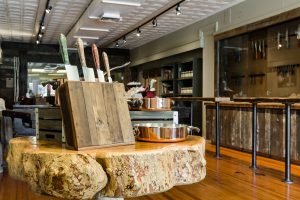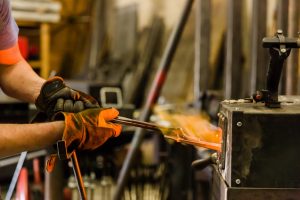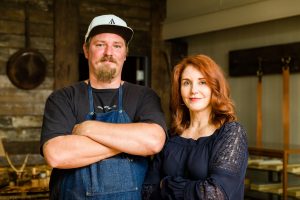NHB Knifeworks Makes Mark on Route 66
By Greg Gonzales
When travelers take Historic Route 66 through St. Louis and stop at NHB Knifeworks, they feel like they stepped back in time. The sights and smells in the shop, the local crafters working just through the window inside and products all sourced and made in the USA hanging on the walls give the space a rustic feel. However, when visitors get the full tour, they’ll realize it’s a relatively new business with a passion for quality and connection. Founded in 2012 by Knifemaker Nate Bonner and Product Curator Melody Noel, NHB is both a knife workshop and a retail space dedicated to showing what all-American products are all about.
 “The entire front end of the shop is all retail, then it hits a beautiful, century-old wooden wall, and there’s a giant window in there where you can see into the upper part of our workspace ― there are two floors: we work in the basement, where our kiln and our forge are, and then upstairs is a little more polished, where you can see, and that’s where we do live knifemaking,” said Bonner. “I run the grinder up there, we make handles and cut all our wood in front of everybody. You can spend a good hour in here watching us make knives and definitely learn something.”
“The entire front end of the shop is all retail, then it hits a beautiful, century-old wooden wall, and there’s a giant window in there where you can see into the upper part of our workspace ― there are two floors: we work in the basement, where our kiln and our forge are, and then upstairs is a little more polished, where you can see, and that’s where we do live knifemaking,” said Bonner. “I run the grinder up there, we make handles and cut all our wood in front of everybody. You can spend a good hour in here watching us make knives and definitely learn something.”
 What people learn watching production at NHB is Bonner’s passion for his craft. “If you were to take your stereotypical cowboy, blacksmith, Wild West goldrush era knife and mash that up with some modern Japanese style knives, I’d say that’s kind of where I hang out at,” he said. “I don’t do a lot of traditional Japanese stuff by any stretch of the imagination, and I don’t want it ever to come off that way ― it’s not what I’m about ― but you can definitely see some Japanese influence in my shaping. The way we make our handles, you can see some influence there, but the overall vibe ― and especially the part of knifemaking I enjoy ― is the oil quenching, the American 1095 steel. Those are my happiest days, when sparks are flying and there are giant fireballs coming out of big kegs of oil.”
What people learn watching production at NHB is Bonner’s passion for his craft. “If you were to take your stereotypical cowboy, blacksmith, Wild West goldrush era knife and mash that up with some modern Japanese style knives, I’d say that’s kind of where I hang out at,” he said. “I don’t do a lot of traditional Japanese stuff by any stretch of the imagination, and I don’t want it ever to come off that way ― it’s not what I’m about ― but you can definitely see some Japanese influence in my shaping. The way we make our handles, you can see some influence there, but the overall vibe ― and especially the part of knifemaking I enjoy ― is the oil quenching, the American 1095 steel. Those are my happiest days, when sparks are flying and there are giant fireballs coming out of big kegs of oil.”
The company moved its big oil kegs into its current space just over two years ago, Noel, Bonner’s stepmother, said, adding that the retail side of the shop started with about 15 or 20 different products. “During that time we’ve had an opportunity to explore various areas but we’ve focused on our local area,” she said. “We found, for instance, cutting board makers here in Missouri who are making awesome products. We’re trying to do as much locally as we can. We carry copper pots ― these beautiful, traditional-style pots, from Brooklyn. We’ve got our own local blacksmith making hamburger spats and copper ladles, turners you can’t find anywhere else. It’s a wide variety of products and artists, ranging from the Northwest all the way down to Florida.”
Though retail takes up about two thirds of the store, much of the focus is on knifemaking, Bonner’s passion since he was young. He said he couldn’t remember a specific moment when he became interested in knives, that he felt that knifemaking was in his genes, which eventually led him to become a chef. “That was half the reason I became a chef anyway ― it was an excuse to work with knives every day, get good at it, the whole culture around that.”
 NHB’s knives are all one-of-a-kind pieces, available in stainless steel, carbon and Damascus blades, with wood handles, all sourced in the U.S. “The Damascus is a little more scarce because it take us a lot longer to make. We make our own Damascus instead of buying and shaping it ― and that’s a common practice in the knife world today, to just go through a Damascus producer, get a bar of it, make a knife out the bar, tah-dah, there ya go, but we’re actually making our own,” said Bonner. “That’s definitely more on our custom end. Stainless and carbon, we have readily available, and we’re happy to make whatever shapes people want. At the start of my knifemaking career I used to get really scared about that ― now I welcome it. If somebody wants to change up a blade style, by all means, let’s change it up! Working in stock removal, which is my favorite way to make knives, it’s really easy to change and manipulate that blade into whatever somebody wants.” As for the handles, Bonner said he’s proud to stay mostly local, adding that buckeye root and maple burl are his current favorites. “We use a lot of local wood. We made some knives recently out of wood that was sourced about 40 miles from the shop,” he said. “A lot of stuff is what I get from Oregon, and I’d say our really choice stuff is coming out of there, and Washington. We don’t do a lot of exotics or anything like that. I have some rare, weird stuff in my private collection that I don’t mind showing people once in awhile, but I’d say about 90 percent of the wood I’m using right now is local, and it’s rare I would buy any products from outside the U.S. There were a handful of times we sourced a handful of steel from Sweden, but the only reason was because it was legitimately better steel. Right now, our knives, down to our micarta and glue, is 100 percent American.”
NHB’s knives are all one-of-a-kind pieces, available in stainless steel, carbon and Damascus blades, with wood handles, all sourced in the U.S. “The Damascus is a little more scarce because it take us a lot longer to make. We make our own Damascus instead of buying and shaping it ― and that’s a common practice in the knife world today, to just go through a Damascus producer, get a bar of it, make a knife out the bar, tah-dah, there ya go, but we’re actually making our own,” said Bonner. “That’s definitely more on our custom end. Stainless and carbon, we have readily available, and we’re happy to make whatever shapes people want. At the start of my knifemaking career I used to get really scared about that ― now I welcome it. If somebody wants to change up a blade style, by all means, let’s change it up! Working in stock removal, which is my favorite way to make knives, it’s really easy to change and manipulate that blade into whatever somebody wants.” As for the handles, Bonner said he’s proud to stay mostly local, adding that buckeye root and maple burl are his current favorites. “We use a lot of local wood. We made some knives recently out of wood that was sourced about 40 miles from the shop,” he said. “A lot of stuff is what I get from Oregon, and I’d say our really choice stuff is coming out of there, and Washington. We don’t do a lot of exotics or anything like that. I have some rare, weird stuff in my private collection that I don’t mind showing people once in awhile, but I’d say about 90 percent of the wood I’m using right now is local, and it’s rare I would buy any products from outside the U.S. There were a handful of times we sourced a handful of steel from Sweden, but the only reason was because it was legitimately better steel. Right now, our knives, down to our micarta and glue, is 100 percent American.”
Sourcing products in the U.S. is a part of the company’s core philosophy. “The U.S. manufacturing sector has gotten a bad rap for some time now, and I think it’s important for people to know there are awesome products being made here,” said Noel. “We want to support artisans, other people in the U.S. who are doing similar things.” Bonner added that the best products he grew up with through the 80s and 90s were American-made, and now he won’t even touch knives from some of his formerly favorite knife companies. “The reason is that they had great-quality knives made in the U.S. but they all decided to make the move overseas” he said. “You’ve probably seen ‘Designed in the USA’ is a big thing, and that pisses me off. It’s riding our coattails. We’re the ones who aren’t getting these insanely high profit margins because we believe in supporting American hands. I associate that with quality. Fishing rods? All my best rods were American made. Skateboarding? All my best boards were American made. All my best guitars? American made. I wanted to follow suit with that and do everything here. To go out and find all the American-made stuff, that’s where our challenge is. Mel’s done an exceptionally good job at pulling all of that together. When we were first finding the product and getting the shop stocked, we had a lot of high-five moments, like, ‘Oh my god, we found an apron company!’ because there’s always apron companies out there but few of them are made here. They might be designed in the U.S. and those designs are emailed to China, but at that point it’s not really an American product. I don’t want to knock the other businesses, but if you’re going to be an American company and print an American flag or USA on anything, you should stand behind that 100 percent, not 10 percent. If you support our country’s economy, this is a great way to do it, and it also brings people in ― your customers want to make that statement, they want to buy that cutting board made by this cool guy named Doug ― they can learn his story and spread it around, and make that statement in their homes. It’s a little bit more money ― it’s a big decision to spend $400 on a kitchen knife versus $39, but once we get people in here, when they’re confronted with that decision of where they want to put their money, once they think about it and talk it out, they want to spend it here.”
Bonner added that NHB earned a loyal customer base that even extends overseas through good service and the quality of its products. “It’s not this big, faceless company ― it’s a tiny company where someone will actually answer the phone, and if you shoot us a message on Instagram or Facebook it goes straight to my cellphone and I always respond,” he said. “Anytime anyone ever wants to talk to us, we’re here and super easy to get hold of. We want people to call us and ask questions. We even have a deal where, if you buy a certain number of knives, I’ll show up and do a demo wherever you’re at ― out of state, East Coast, West Coast, doesn’t matter. We want to build relationships with the people who want to sell our products, and if that means I take a trip to you ― maybe sneaking in some fishing while I’m there ― that’s what it takes.”

You must be logged in to post a comment.